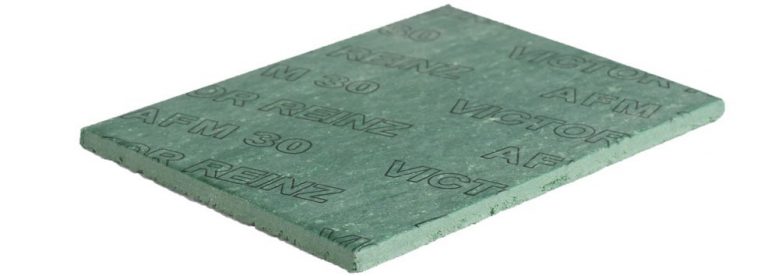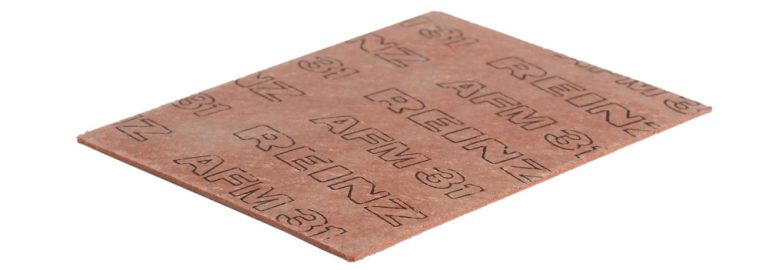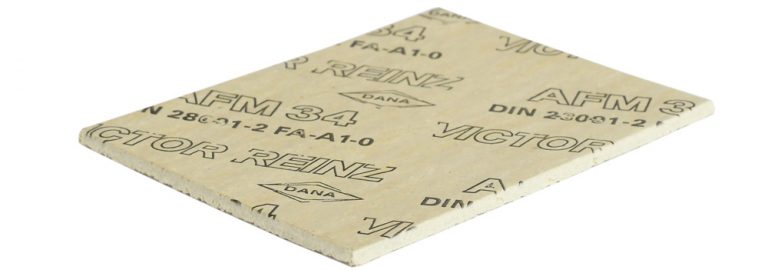AFM-Dichtungen
AFM-Dichtungen bestehen vorrangig aus Aramidfasern, Asbestsubstituten und je nach gewählter Qualität aus weiteren füllenden Substanzen. Aus diesem Grund ist der Werkstoff hervorragend als Dichtungsmaterial geeignet.

Verfügbare AFM-Qualitäten bei der Rehm Dichtungen Ehlers GmbH
Bei uns haben Sie die Möglichkeit, aus verschiedenen AFM-Qualitäten zu wählen und von uns verarbeiten zu lassen. AFM 34 des Herstellers REINZ gilt als Klassiker, da es in vielen Bereichen universell einsetzbar ist.
Die folgenden Angaben beziehen sich auf eine Material-Nenndicke von 2,00 mm.
AFM 30
Das Dichtungsmaterial AFM 30 ist ein asbestfreies Dichtungsmaterial, welches grundsätzlich aus Aramidfasern und weiteren hochtemperaturbeständigen Asbestsubstituten besteht, die mit Elastomeren verarbeitet sind.
AFM 30
Der Werkstoff besitzt sehr gute thermische und mechanische Eigenschaften sowie eine hohe Druckstandsfestigkeit. Aus diesem Grund werden Flachdichtungen aus diesem Dichtungsmaterial zur Abdichtung von Gasen und Flüssigkeiten verwendet.
Technisches Datenblatt:
Eigenschaften:
| Dichte [g/cm³] | ISO 1183 | 1,75-1,95 |
| Zugfestigkeit [N/mm²] | ASTM F152 | > 12 |
| Druckstandfestigkeit [N/mm²] | DIN 52 913 | ≈ 25 |
| Dauertemperatur | 250° C | |
| Betriebsdruck max. [bar] | 125 |
Zulassungen und Zertifizierungen:
- DIN-DVGW nach DIN 3535, Teil 6 FA
- DIN 30653 (vormals VP 401) für höher thermisch belastbare Dichtungen (HTB)
- BAM für Flanschverbindungen in Sauerstoff-Stahlrohrleitungen bis 100 bar und 80 °C
- Germanischer Lloyd (DNV GL) als Freigabe für den Schiffbau

AFM 31
Das asbestfreie Dichtungsmaterial AFM 31 mit hoher Flexibilität, exzellenter Anpassungsfähigkeit und zuverlässiger Dichtwirkung für Flüssigkeiten und Gase.
AFM 31
Bei dem Werkstoff AFM 31 handelt es sich ebenfalls um ein asbestfreies Dichtungsmaterial.
Hinsichtlich der Eigenschaften lassen sich vor allem die hohe Anpassungsfähigkeit, die hohe Kompressibilität und Flexibilität sowie die sehr gute Dichtwirkung gegen Flüssigkeiten und Gase hervorheben.
Technisches Datenblatt:
Eigenschaften:
| Dichte [g/cm³] | ISO 1183 | 1,4 – 1,7 |
| Zugfestigkeit [N/mm²] | ASTM F152 | > 8 |
| Druckstandfestigkeit [N/mm²] | DIN 52 913 | ≈ 24 |
| Dauertemperatur | 250° C | |
| Betriebsdruck max. [bar] | 80 |

AFM 34
AFM 34 ist das asbestfreie Hochleistungs-Dichtungsmaterial mit Aramidfasern, hoher Zug- und Druckfestigkeit sowie ausgezeichneter Beständigkeit gegen hohe Temperaturen und Drücke – ideal für die sichere Abdichtung von Gasen, Flüssigkeiten und Dampf.
AFM 34
Bei AFM 34 handelt es sich um ein asbestfreies Dichtungsmaterial, welches Aramidfasern, anorganische Füllstoffe und weitere hochtemperaturbeständige Substanzen enthält und physiologisch unbedenklich ist.
AFM 34 weist eine hohe Zug- und Druckfestigkeit auf. Flachdichtungen aus dem Dichtungsmaterial werden vor allem zur Abdichtung von Gasen und Flüssigkeiten (z.B. Ölen, Lösungsmitteln, Kraftstoffen) sowie zur Abdichtung von Heißwasser und Dampf bis 200 °C verwendet. Ebenfalls zeichnet sich der Werkstoff durch eine hohe Temperaturbeständigkeit sowie eine gute Einsatzbarkeit bei hohen Drücken aus.
Technisches Datenblatt:
Eigenschaften:
| Dichte [g/cm³] | ISO 1183 | 1,8 – 2,0 |
| Zugfestigkeit [N/mm²] | ASTM F152 | >18 |
| Druckstandfestigkeit [N/mm²] | DIN 52 913 | ≈ 25 |
| Dauertemperatur | 250° C | |
| Betriebsdruck max. [bar] | 150 |
Zulassungen und Zertifzierungen:
- DIN-DVGW nach DIN 3535, Teil 6 FA
- DIN 30653 (vormals VP 401) für höher thermisch belastbare Dichtungen (HTB)
- Fire Safe nach BS 6755 und API 6FB
- BAM für Flanschverbindungen in Sauerstoff-Stahlrohrleitungen bis 100 bar und 80 °C
- TA Luft für hochwertige Dichtungen (200 °C, 48h und 2000h)
- Germanischer Lloyd (DNV GL) als Freigabe für den Schiffbau

AFM 38
Das wirtschaftliche asbestfreie Dichtungsmaterial AFM 38 mit hoher Kompressibilität, Flexibilität und exzellenter Gasdichtigkeit – optimal für öl- und lösungsmittelbeständige Anwendungen.
AFM 38
Der Werkstoff AFM 38 ist das preiswerteste AFM-Material. Der asbestfreie Faserstoff ist ein öl- und lösungsmittelbeständiges Dichtungsmaterial und zeichnet sich durch die hohe Kompressibilität und Flexibilität sowie die hohe Gasdichtigkeit aus.
Technisches Datenblatt:
Eigenschaften:
| Dichte [g/cm³] | ISO 1183 | 1,5 – 1,7 |
| Zugfestigkeit [N/mm²] | ASTM F152 | > 7 |
| Druckstandfestigkeit [N/mm²] | DIN 52 913 | > 25 |
| Dauertemperatur | 220° C | |
| Betriebsdruck max. [bar] | 60 |
Zulassungen und Zertifizierungen:
- Germanischer Lloyd (DNV GL) als Freigabe für den Schiffbau
AFM 39
AFM 39 ist temperaturbeständig, hoch anpassungsfähig und mit zuverlässiger Dichtwirkung – ideal für leicht verformbare Bauteile und nach DNV GL für den Schiffsbau freigegeben.
AFM 39
Temperaturbeständig und sehr anpassungsfähig. Gute Dichtwirkung auch bei leicht verformbaren Bauteilen. Nach DNV GL für den Schiffsbau freigegeben.
Technisches Datenblatt:
Eigenschaften:
| Dichte [g/cm³] | ISO 1183 | 1,8 – 2,0 |
| Zugfestigkeit [N/mm²] | ASTM F152 | > 7 |
| Druckstandfestigkeit [N/mm²] | DIN 52 913 | > 25 |
| Dauertemperatur | 220° C | |
| Betriebsdruck max. [bar] | 60 |
AFM 39/2
Wie bei den anderen AFM-Dichtungsmaterialien ist die AFM 39/2 asbestfrei und physiologisch unbedenklich.
AFM 39/2
Auch dieser Werkstoff ist anpassungsfähig und flexibel und kann bei einer geringen Flächenpressung eine gute Dichtwirkung erreichen. Zudem besitzt AFM 39/2 eine ausreichend hohe Druckstandsfestigkeit und Gasdichtigkeit. Das Dichtungsmaterial ist gegenüber Lösungsmitteln, Ölen, Kraftstoffen, und weiteren Medien beständig.
Technisches Datenblatt:
Eigenschaften:
| Dichte [g/cm³] | ISO 1183 | 1,75 – 1,95 |
| Zugfestigkeit [N/mm²] | ASTM F152 | > 7 |
| Druckstandfestigkeit [N/mm²] | DIN 52 913 | ≈ 25 |
| Dauertemperatur | 220° C | |
| Betriebsdruck max. [bar] | 60 |
Zulassungen und Zertifizierungen:
- Elastomerleitlinie (vormals KTW)
- DVGW-Arbeitsblatt W270 zur mikrobiologischen Eignung
- Germanischer Lloyd (DNV GL) als Freigabe für den Schiffbau
Die Eigenschaften von AFM-Dichtungen als Dichtungsmaterial
Je nach Qualität enthält der Werkstoff Aramidfasern und andere asbestfreie, temperaturbeständige Substanzen sowie anorganische Füllstoffe. Die bei uns erhältlichen AFM-Dichtungen der REINZ-Dichtungs-GmbH sind Weichstoffmaterialien, die universelle Eigenschaften besitzen und in vielen Bereichen der Industrie verbaut werden können.
AFM 39/2 ist beispielsweise ein anpassungsfähiges, physiologisches Weichstoffmaterial und entsprechend mit DVGW W270 zertifiziert. AFM 38 hat eine DNV GL-Freigabe (Germanischer Lloyd) und ist damit für den Einsatz im Schiffsbau geeignet. Weiterhin ist das preisgünstige Material sowohl öl- und lösungsmittelbeständig als auch hervorragend gasdicht. Insbesondere bei geringen Flächenpressungen kann eine hohe Dichtwirkung erreicht werden.
Die Vorteile und Materialeigenschaften von AFM-Dichtungen auf einen Blick
AFM eignet sich als Dichtungsmaterial aufgrund einer Reihe an Spezifikationen, die besonders im Kontext von mechanisch und thermisch anspruchsvollen Anwendungen verlangt werden.
Der Werkstoff ist:
- hochtemperaturbeständig
- mechanisch-thermisch; sehr fest
- hoch druckstandfestig
- beständig gegen Öle, Gase und Kraftstoffe
- beständig gegen Gemische aus Wasser mit Frostschutzmitteln
- sehr flexibel
Auch für Rohrleitung sind AFM-Dichtungen bzw. -Flachdichtungen eine gute Wahl, damit Gase und Flüssigkeiten an Verbindungsstellen nicht austreten können. Die Faserstoffe passen sich gut an unterschiedliche Oberflächengegebenheiten an.
Sie haben Fragen oder möchten sich kostenlos beraten lassen?
Kontaktieren Sie uns gerne – wir helfen Ihnen! Unser engagiertes Team steht Ihnen stets zur Verfügung, um Ihre Fragen zu beantworten.
Anwendungsgebiete von AFM-Dichtungen
Flachdichtungen bzw. Flanschdichtungen aus AFM kommen in den unterschiedlichsten industriellen Bereichen zum Einsatz.
Dichtungen aus AFM 30 finden insbesondere in Kompressoren, Rohrleitungen, Apparaten, Getrieben, Gaszählern und Verbrennungsmotoren Anwendung. Des Weiteren wird das Dichtungsmaterial zur Abdichtung von Getriebe-, Hydraulik und Motorölen sowie Kraftstoffen eingesetzt.
Flachdichtungen aus AFM 31 werden vor allem in Dichtstellen mit leicht verformbaren Konstruktionsteilen bei geringer Flächenpressungen eingesetzt. Als Beispiele können Ölwannen, Kompressoren, Rohrleitungen Apparate und Getriebe genannt werden. Auch zur Abdichtung gegenüber Motor-, Getriebe- und Hydraulikölen sowie Kraftstoffen ist der Werkstoff geeignet.
Auf der Grundlage der physiologischen Unbedenklichkeit von AFM 34 können Dichtungen bzw. Flachdichtungen aus diesem Werkstoff im Trinkwasser- und Lebensmittelbereich sowie zur Abdichtung verschmutzungsempfindlicher Produkte eingesetzt werden.
Dank der mechanischen und thermischen Eigenschaften lässt sich das Dichtungsmaterial als hochbeanspruchbare Dichtung im Bereich von Verbrennungsmotoren, Ölfilter, sowie bei Öl-, Kraftstoff- und Vakuumpumpen verwenden. Darüber hinaus ist uns der Einsatz von Flachdichtungen aus AFM 34 in DIN- und ANSI-Rohrleitungsflanschen sowie Pumpen und Armaturen von Industrieanlagen bekannt. Das Anwendungsgebiet von AFM 34 umschließt den Einsatz in Warmwasserthermen, Solaranlagen und in Heizkörperanschlüssen.
Zu den Einsatzzwecken von AFM 38 zählen Dichtverbindungen mit geringen thermischen und mechanischen Anforderungen.
Dichtungen aus AFM 39/2 können aufgrund der physiologischen Unbedenklichkeit in der Trinkwasser- und Lebensmittelindustrie eingesetzt werden. Weitere Anwendungsgebiete des Faserstoffs befinden sich in Apparaten, Getrieben, Pumpen und Sanitärarmaturen.
Ob der Faserstoff auch für Ihre Anwendungen geeignet ist, beantworten wir Ihnen gern. Kontaktieren Sie dazu unseren Kundenservice und lassen Sie sich umfassend beraten.
FAQ
Was sind AFM-Dichtungen?
Können AFM Dichtungen auch selbstklebend ausgestattet werden?
In welchen Formen können AFM-Qualitäten bei Rehm Dichtungen bezogen werden?
Wo können AFM-Dichtungen eingesetzt werden?
Zu den Faserstoffdichtungen zurückkehren



